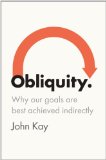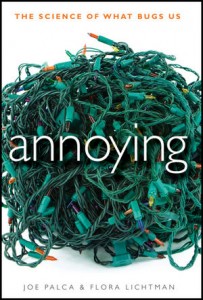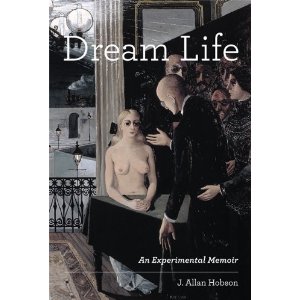April 29, 2011

Recently published in the US: Obliquity: Why Our Goals Are Best Achieved Indirectly by economist John Kay (Penguin, 2011)
(kindle ed.), (amazon.co.uk)
Product description from the publisher:
A leading economist charts the indirect road to happiness and wealth.
Using dozens of practical examples from the worlds of business, politics, science, sports, literature, even parenting, esteemed economist John Kay proves a notion that feels at once paradoxical and deeply commonsensical: The best way to achieve any complex or broadly defined goal-from happiness to wealth to profit to preventing forest fires-is the indirect way. As Kay points out, we rarely know enough about the intricacies of important problems to tackle them head-on. And our unpredictable interactions with other people and the world at large mean that the path to our goals-and sometimes the goals themselves-will inevitably change. We can learn about our objectives and how to achieve them only through a gradual process of risk taking and discovery-what Kay calls obliquity.
Kay traces this pathway to satisfaction as it manifests itself in nearly every aspect of life. The wealthiest people-from Andrew Carnegie to Bill Gates-achieved their riches through a passion for their work, not because they set materialistic goals. Research has shown that companies whose goal (as declared in mission statements) is excellent products or service are more profitable than companies whose stated goal is increasing profits. In the personal realm, a large body of evidence shows that parenthood is on a daily basis far more frustrating than happy- making. Yet parents are statistically happier than nonparents. Though their short-term pleasure is often thwarted by the demands of childrearing, the subtle-oblique-rewards of parenthood ultimately make them happier.
Once he establishes the ubiquity of obliquity, Kay offers a wealth of practical guidance for avoiding the traps laid by the direct approach to complex problems. Directness blinds us to new information that contradicts our presumptions, fools us into confusing logic with truth, cuts us off from our intuition (which is the subconscious expression of our experience), shunts us away from alternative solutions that may be better than the one we’re set on, and more. Kay also shows us how to acknowledge our limitations, redefine our goals to fit our skills, open our minds to new data and solutions, and otherwise live life with obliquity.
This bracing manifesto will convince readers-or confirm their conviction-that the best route to satisfaction and success does not run through the bottom line.
See also: Author’s website
Comments (0)
- happiness,new books,psychology
April 27, 2011

Annoying: The Science of What Bugs Us by Joe Palca and Flora Lichtman (Wiley, 2011)
(kindle ed.), (amazon.co.uk)
Product description from the publisher:
Two crackerjack science journalists from NPR look at why some things (and some people!) drive us crazy
It happens everywhere – offices, schools, even your own backyard. Plus, seemingly anything can trigger it: cell phones, sirens, bad music, constant distractions, your boss, or even your spouse. We all know certain things get under our skin. Can science explain why? Palca and Lichtman take you on a scientific quest through psychology, evolutionary biology, anthropology, and other disciplines to uncover the truth about being annoyed. What is the recipe for annoyance? For starters, it should be temporary, unpleasant, and unpredictable, like a boring meeting or mosquito bites
* Gives fascinating, surprising explanations for why people react the way they do to everything from chili peppers to fingernails on a blackboard
* Explains why irrational behavior (like tearing your hair out in traffic) is connected to worthwhile behavior (like staying on task)
* Includes tips for identifying your own irritating habits!
How often can you say you’re happily reading a really Annoying book? The insights are fascinating, the exploration is fun, and the knowledge you gain, if you act like you know everything, can be really annoying.
See also: New York Times review
Comments (0)
- cognitive science,new books,psychology
April 25, 2011
Amazon.com has removed some of the more specific categories from the New Releases and Browse Subjects sections. For example, we used to be able to drill down from “Nonfiction” to “Philosophy” to “Consciousness & Thought,” but now the selections stop at “Philosophy.” It is still possible to find the more specific categories through a Google search, such as: site:amazon.com new releases consciousness thought & subscribe to the feed provided at the bottom of the page at Amazon.com.
Here are links to the new releases in “Consciousness & Thought” and “Neuropsychology”:
Amazon’s New Releases in Consciousness & Thought
Amazon ‘s New Releases in Neuropsychology
Comments (0)
- book search,new books
April 19, 2011

Dream Life: An Experimental Memoir by J. Allan Hobson (MIT Press, 2011)
(amazon.co.uk)
Product description from the publisher:
J. Allan Hobson’s scientific experimentation began in childhood, with a soot-filled investigation into the capacity of a chimney to admit Santa Claus. (He discovered that even with the damper open the chimney was far too narrow.) Hobson’s life as an experimentalist has continued through a pioneering career devoted to aligning psychology and biology and to investigating the relationship of dreaming and consciousness. In Dream Life, Hobson conducts an experimental investigation into his life and work.
Hobson charts his developing consciousness through a vividly imagined conception (in October of 1932), birth, and babyhood, offering a theory about “protoconsciousness” in fetuses and infants. He recounts his youthful zeal for scientific discovery, his early sexual experimentation, and his education. He describes taking on the entrenched Freudians at Harvard Medical School in the 1950s, as a maverick psychiatrist who wanted to replace psychoanalysis with biological science. He describes his further studies, his marriages and love affairs, his travels, and what he learned about the brain from his whiplash-induced amnesia after a 1963 automobile accident and from his “brain death” after a stroke in 2001. Through it all, Hobson uses his life as the ultimate case study for his theory that REM sleep provides a test pattern that allows the brain to develop “offline.” Dreams—most intense in REM sleep, when the brain is active—need no Freudian-style decoding, he says. Dreaming is a glorious mental state, to be enjoyed and studied for what it tells us about consciousness.
See also: Author’s website
Comments (0)
- cognitive science,consciousness,new books
April 18, 2011

Boredom: A Lively History by Peter Toohey (Yale University Press, 2011)
(amazon.co.uk)
Product description from the publisher:
In the first book to argue for the benefits of boredom, Peter Toohey dispels the myth that it’s simply a childish emotion or an existential malaise like Jean-Paul Sartre’s nausea. He shows how boredom is, in fact, one of our most common and constructive emotions and is an essential part of the human experience.
This informative and entertaining investigation of boredom—what it is and what it isn’t, its uses and its dangers—spans more than 3,000 years of history and takes readers through fascinating neurological and psychological theories of emotion, as well as recent scientific investigations, to illustrate its role in our lives. There are Australian aboriginals and bored Romans, Jeffrey Archer and caged cockatoos, Camus and the early Christians, Dürer and Degas. Toohey also explores the important role that boredom plays in popular and highbrow culture and how over the centuries it has proven to be a stimulus for art and literature.
Toohey shows that boredom is a universal emotion experienced by humans throughout history and he explains its place, and value, in today’s world. Boredom: A Lively History is vital reading for anyone interested in what goes on when supposedly nothing happens.
See also: “boredom” – more books at amazon.com
Comments (0)
- cognitive science,new books,psychology






